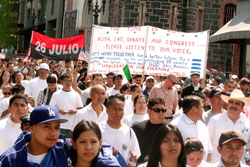The debate over immigration
The voices of immigrants have been louder lately as the United States government considers what should be done about undocumented workers. Enraged by a proposal to make hiring an undocumented worker a felony, citizens and illegal immigrants alike have taken to the streets in protest. The debate over what should be done can be heard all over, even at Mt. Hood. Shannon Valdivia, the Forensics coach and proud daughter of an illegal immigrant, said she thinks one bill is more reasonable than the others. “I believe the most reasonable one is the Senate bill because it allows for a not guaranteed citizenship track, but allows [the immigrants] to get citizenship down the road and calls for a citizenship test which requires them to speak English, things like that.” Valdivia added “I don’t think that there’s an adequate compromise one way or the other until both issues – the fact that they’re breaking the law plus the concerns of border security – are resolved.” Valdivia believes the United States’ first priority should be border security. “At the same time we can’t be focusing that the only border not secured is the southern border. I find that to be narrow-minded and ridiculous.” David Sussman, the coordinator of the Central American Student Scholarship (CASS) program, believes the proposed legislation is “a short-term solution to a long-term problem.” Sussman adds, “The problem with the current legislation is that it’s not looking at the causes.” Sussman believes that the “less opportunities that you give people to create better lives for themselves, there’s an exponential growth in socio, political, and environmental problems.” Latino Club members believe some people should get amnesty, especially if they have lived here for over 10 years. They think the United States should help coordinate with Mexico to get green cards, and that the government should not make criminals of those people who have been working here and who are paying taxes. The Transiciones program at Mt. Hood works closely with many Spanish-speaking women. Elizabeth Perry works with the program, and said the program cannot help individuals with immigration issues. “Immigration is such that each case is individual, and people are here, typically, on a number of different statuses,” she said. “People really need good legal advice in order to understand each case. If a student comes, for example, with a question about [immigration], we have a list of resources in the community that they can go to get legal advice. We can direct them to community resources and attorneys that might be able to analyze their case.” Perry said people can be in a pending status for a long time. Many of the students Perry comes in contact with have expressed concern over the latest legislative proposals. “There’s a lot of fear and concern about that,” she said. “I’ve heard some really hurtful comments that students have shared with me, things that are actually happening in class. Because immigration is a hot topic, some classroom discussions have been very hurtful to students.” For Perry, the legislative movements are stirring up more than just controversy. “People come from all political interpretations. I think that is why the current immigration debate [is happening, but] in some ways, at least people are talking about it. It’s problematic in the way it’s being talked about, in my opinion, but it’s being talked about. Hopefully out of what is happening, people will have a greater understanding.” Perry said students do not need to be documented to enroll in school.
|
